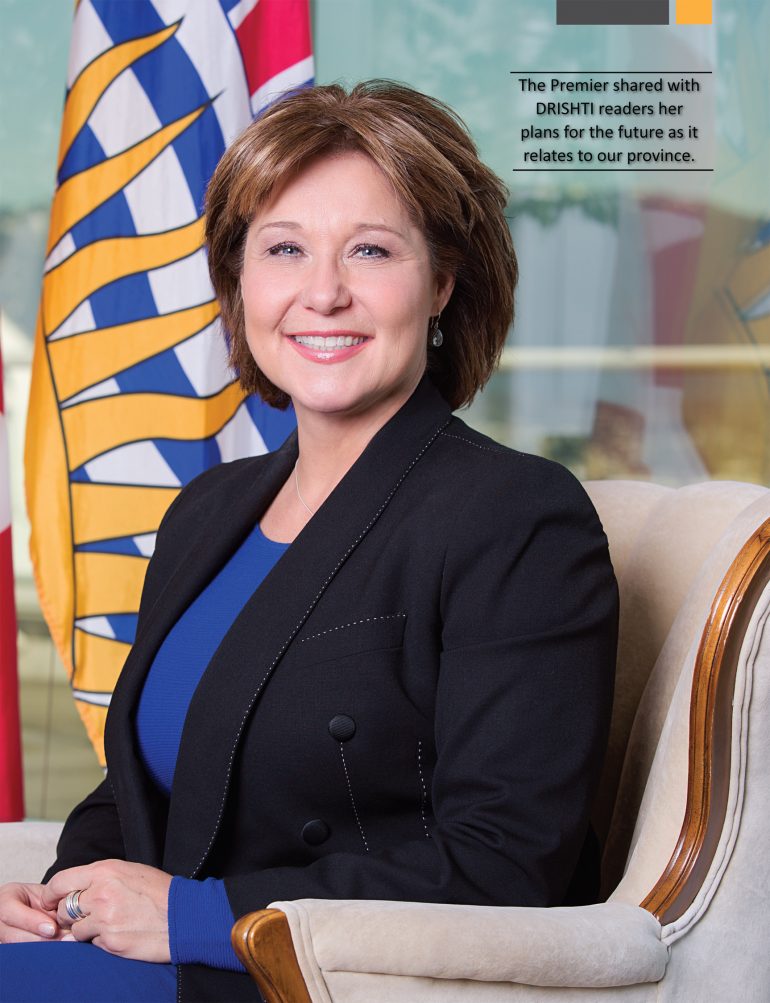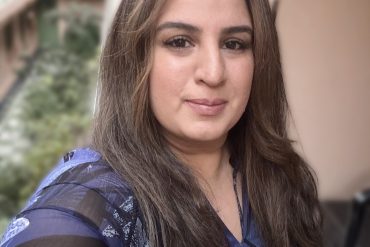Premier Christy Clark’s Story of Strength, Vision, and Resilience
In this day and age, it takes several layers of thick skin to hold public office. The speed by which news travels has never been faster, thanks to numerous twenty-four-hour news channels, social media, and information – often from questionable sources – that can be accessed immediately via the internet through portable devices.
The Premier of British Columbia, Christy Clark, has certainly proven to have that aforementioned thick skin. DRISHTI Magazine had the privilege of sitting down with the 35th Premier of British Columbia to discuss how she has managed to hold true to her values while being one of the most scrutinized political figures in our province.
The Premier first served as a Member of the Provincial Legislative in 1996 and acted as Deputy Premier from 2001 to 2005. She has also served as Minister of Education, Minister of Children and Family Development and vice-chair of Treasury Board. She took a brief break from politics in the mid-2000s, at which time she was a weekly columnist for the Vancouver Sun and Province Newspapers, as well as hosted her radio program, “The Christy Clark Show,” on CKNW radio.
Premier Clark was sworn in as our Premier on March 14, 2011, and sworn in for her second term on June 10, 2013. It has been over twenty years since she first entered politics and her ability to handle pressure and fought for what she believes in developed much earlier in her life.
Premier Clark was born in Burnaby, British Columbia, and graduated from Burnaby South Senior Secondary. “Burnaby at the time, in 1965,” she recalls, “was a lot like Surrey is now. It was booming. There were tons of kids.” She credits her parents for instilling values of “hard work, humility, the value of family and looking after one another.”
“My dad was a public school teacher, and my mom was a stay-at-home mom. She kept herself busy with all types of volunteer work, to take care of the kids and manage the family budget so that my dad’s income would last.”
Premier Clark’s father was also involved in provincial politics, running on several occasions for provincial office. Thus, her exposure to politics began at an early age. Premier Clark advises that her father encouraged all of his children to express themselves, that he emphasized that “we should always value everyone’s opinion. At the dinner table, he would encourage debates. He wanted all of us to be competent in saying what we believe.” Premier Clark considers “those years were values-defining for me.” She recalls that “I was the youngest, so I didn’t win the debates very often, but I did learn not to back down.” She also learned that “just because someone is louder than you, doesn’t mean that they are right and you are wrong.”
Besides her parents, Premier Clark credits her grandmother as being a significant influence in her formative years. “My grandmother graduated from the University of Toronto in 1924 with a Modern Languages Degree. She was one of the only women to graduate with a degree that year. I admired that.” She notes that “women were not going to university to do undergraduate degrees back then, but she had the courage to do it.” Christy recalls that her grandmother “was a wonderfully gracious person, and she was made out of steel. She was tough. She lived through the depression; she went to university during a time few women did – she was tough.”
Politically, Premier Clark cites as a significant influence former British Columbian Premier W.A.C. Bennett. While she never met him, she was very much inspired by him. “He was a big dreamer. He had a great vision for BC. He was bold and gutsy, whenever he was criticized, he just took it on the chin and kept going. That for me is a model for leadership. And he was an ordinary man. He was a small-town guy, he never forgot the value of a dollar, and never forgot the importance of family.”
While a student at Simon Fraser University, Premier Clark joined the Young Liberals Club. The BC Liberals under Gordon Wilson were putting together a slate of candidates for the 1991 election, and Christy hopped into a vehicle and traveled to various parts of the province in efforts to engage British Columbians. “It was a tremendous learning experience, hearing from British Columbians about what they wanted and where they wanted the province to go” she notes. “My parents taught me to be humble, and a big part of being humble is listening; just listening. And that’s what I did during those times I engaged with British Columbians.”
Several people asked Christy to run for the 1996 election, and she agreed. She thought “maybe I should run and try to be the voice of those British Columbians who don’t feel heard.” Premier Clark recalls that her mother had a few misgivings about her daughter entering politics. “My mom never wanted me to go into politics, and she never liked the negative commentary that goes with it.” While her mother was concerned about the negativity, she still supported her youngest daughter, as did her father and several friends. “There were people around me who thought I’d be good at it,” she recalls, “and individuals who believed I would be good at promoting the values of the BC Liberal Party.”
“I was surrounded by so many people that continued to believe in me. That and my faith in God continued to sustain me. Knowing that there are a lot of people in my life and across the province, who believe that I am doing the right thing and in what our government is trying to do—that sustains me. If you believe in something and are pursuing your values truthfully, then you should never have anything to be ashamed of.”
The Premier shared with DRISHTI readers her plans for the future as it relates to our province. “When I talk about the importance of families, I think about what it is we can do to support and strengthen families. I would argue that the most important thing government can do for families is to ensure people have a great job, where they can provide for the people that they love.”
“Once you’re not worried about money all the time, once you have a secure job and secure future, it makes everything easier. So, for me, my vision is to continue to support job creation in communities large and small throughout the province.” She notes “it’s a virtual cycle. The more jobs you create, the more economic growth there is, the more revenue there is for the government to look after its people.”
When asked if there is anything specific Premier Clark would like to say to DRISTHI Magazine’s South Asian readership, she advises “I am incredibly proud to live in a society like the one we have here in this province. When we look at what is going on around the world, we should be so proud of what we have created here, where you can walk down the street and see someone in a Niqab or Turban, and it’s all a part of who we are. It’s something that we are so used to, that people don’t even think about it. What a strength we have, that we are so accepting of each other. We are unique in that respect.”
“The South Asian community has made an enormous contribution to that, and to who we are today as a province. The work ethic, the entrepreneurial drive, the philanthropy within the community is incredible. The community values of humility, of family, compassion, and sharing, those are values that the community has helped reinforce within our larger society. In a world where we see so much negativity, we need more reminders of about how important it is to love one another, and to be kind to one another.”
Premier Clark also has advice for those considering careers within the political realm. “Figure out what it is that you believe in, and don’t be afraid to stand up for it. Never, ever let somebody silence you, by making you unsure or scared to say what you believe in; because you will always feel better for trying to make your voice heard, even if there are times nobody listened. So, when you go to bed at night, you can feel good about yourself for standing up for what you believed in.”
Premier Clark also notes that “DRISHTI Magazine plays a significant, vital role, in sharing our values.
Part of what holds a society together is the ability to share our stories. So, thank you, DRISHTI for helping to share those stories, to help build understanding. That’s how communities conquer hate, racism, fear – it’s all through being able to tell our stories. So, again, thank you, DRISHTI for being a part of that.”
And we are grateful to you, Premier Clark, for sharing your story – of strength, perseverance, and resilience – with us!



